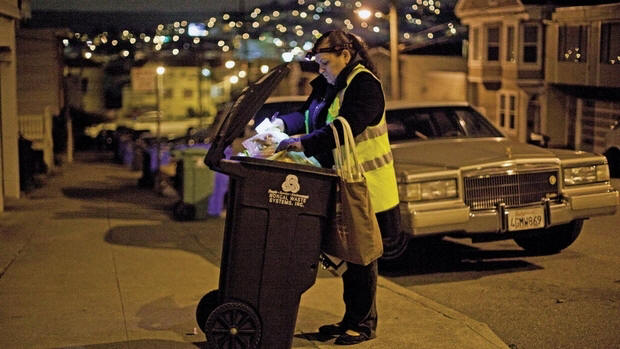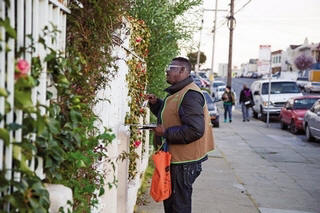Who's that rifling in the trash? San Francisco's cart inspectors
- May 20, 2013
- By Jennifer Kalish
 Mark Andrew Boyer, Special to Waste &
Recycling News San Francisco
cart inspector Nora Calderon looks through a full black bin
in the Bayview neighborhood of the city. The inspectors are
trying to push residents to recycle, compost and throw away
the right materials.
Mark Andrew Boyer, Special to Waste &
Recycling News San Francisco
cart inspector Nora Calderon looks through a full black bin
in the Bayview neighborhood of the city. The inspectors are
trying to push residents to recycle, compost and throw away
the right materials. In most cities, if a person were to look out a window and see a group of people rifling through trash cans, it would be cause for alarm. But in San Francisco, it's just a typical garbage day.
As part of the city's latest effort to boost its already high recycling rate, city trash inspectors are going from neighborhood to neighborhood, digging through residents' carts to make note of improperly sorted materials.
"We are at 80% diversion — today, one of the highest in the country. But still 50% of what's in the black [trash] bins that we all use is either recyclable or compostable," said Guillermo Rodriguez, director of policy & communications for the San Francisco Department of the Environment. "So there's still room for improvement and there's still room for education, and our cart-monitoring program is just another useful tool we have to really help change behavior of customers in San Francisco."
San Francisco operates on a three-cart curbside collection system, where each resident has a blue cart for recycling, a green cart for organics and a black cart for trash. Residents in the city are legally required to separate their waste from organics and recyclables, both at home and at their business, Rodriguez said. The penalty for violating the ordinance is a $100 fine for the first offense.
"Since it was mandatory and it was a requirement, we needed to make sure that there was a vehicle, a process by which we would educate folks on how to sort their waste at home or at their business and have a mechanism to go and ensure that folks were actually complying," he said.
With clipboards, rubber gloves and a flashlight in hand, cart inspectors hit the streets — before the trash trucks — to analyze residents' diversion habits.
"There are three of us on the morning route," said Tina Addi, who has worked as a city cart inspector since August. "We start about 4:45 a.m. because in the neighborhood that we're in, the trucks come a little earlier than they have before."
The inspectors are currently targeting San Francisco's Bayview neighborhood, located on the east side of the city. Before that, they were inspecting carts in the Richmond District, located in the city's northwest corner.
"San Francisco is a big city, and even with our team that's out there we can't do the entire city at any given moment, so we target different zones," Rodriguez said. "We really concentrate in areas where we're seeing a high tonnage volume from our black bins vs. other neighborhoods."
While the cart inspectors aren't actually ripping open trash bags and inspecting every single item, there are many signs they can look for to guide them.
"You can really tell, especially when the black bin is extremely overfilled and you look at the blue and green and they're relatively empty," Rodriguez said. "That's one indicator that there probably is a lot of recyclables and compostable items that can certainly be taken out of the black bin."
 Mark Andrew Boyers, Special to Waste &
Recycling News Keith Dews, a
cart inspector for San Francisco, does a follow-up talk with
a resident who had too many recyclables in the trash.
Mark Andrew Boyers, Special to Waste &
Recycling News Keith Dews, a
cart inspector for San Francisco, does a follow-up talk with
a resident who had too many recyclables in the trash.
Following the inspections, the afternoon team comes back to each house to explain to residents what they did wrong — and not everyone is thrilled to chat about their poor recycling habits.
"Granted, there are always, as with anything, some customers who would like to go back to the day that they just put everything in one cart and not worry about it and think it's somebody else's responsibility," Rodriguez said.
Sometimes, the inspectors will even get doors slammed in their faces, said Addi, who has worked both the morning and afternoon shift.
"I think we've all experienced that," she said.
However, the inspectors will also acknowledge those who are doing a good job at sorting, and there are plenty of other people who are open and interested in learning how to sort correctly.
"I did a lot of outreach in the Bayview, and we actually get a pretty good response," Addi said.
The cart-monitoring program is part of a larger outreach initiative, which the department calls Environment Now. It allows residents to take part in green job training and get paid to help educate others about the city's sustainability efforts.
"They really are our 'boots on the ground,' getting to folks so that we don't just rely on an official or an official note," Rodriguez said. "We really make an effort to get that face-to-face communication."
Though the city has not issued any fines for improper curbside sorting, some residents are concerned that the initiative invades personal privacy.
Paul Telford, a long-time resident of San Francisco, believes that the only thing keeping people from fighting the initiative is the fact that fines haven't been issued.
"If someone were to actually get in trouble, it'd be about a second before there was an uproar, no doubt including a complaint about the rampant scavenging by homeless through the bins," he said in an email to Waste & Recycling News. "There's only so many times you want to sort your garbage, and off the sidewalk in the morning before work is certainly not one of those times."
Still, education is a huge component to a successful zero waste program, and until the city hears significant outcries from residents that the program is overbearing, it will continue inspecting carts, Rodriguez said.
![]()
w w w . w a s t e r e c y c l i n g n e w s . c o m
copyright 2013 by Crain Communications Inc. All rights reserved.